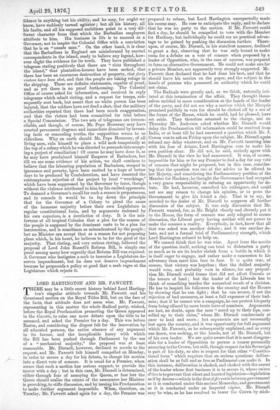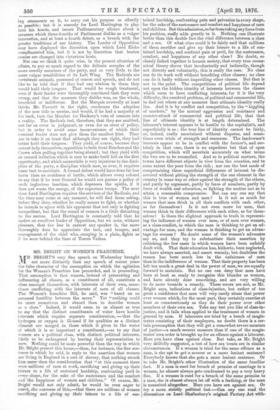LORD HARTINGTON AND MR. FAWCETT.
TFIERE may be a little secret history behind Lord Harting- ton's singular attitude towards Mr. Fawcett and his threatened motion on the Royal Titles Bill, but on the face of the facts, that attitude does not seem wise. Mr. Fawcett, representing in this matter the whole Radical party, wished, before the Royal Proclamation promoting the Queen appeared in the Gazelle, to raise one more debate upon the title to be assumed, and asked the Premier for a day. This was before Easter, and considering the disgust felt for the innovation by all educated persons, the entire absence of any argument in its favour, and the inexplicable hurry with which the Bill has been pushed through Parliament by the use of a "mechanical majority," the proposal was at least reasonable. Mr. Disraeli, however, declined to accede to the request, and Mr. Fawcett felt himself compelled on Monday, in order to secure a day for his debate, to change his motion into a direct vote of censure. It is usual for a Premier, when aware that such a motion has serious support, to provide the mover with a day ; but in this case, Mr. Disraeli is determined, either through fear of annoying the Queen, or fear lest the Queen should realise the extent of the annoyance her Minister is provoking, to stifle discussion, and by issuing his Proclamation to make further argument impossible. When, therefore, on Tuesday, Mr. Fawcett asked again for a day, the Premier was prepared to refuse, but Lord Hartington unexpectedly made his course easy. He rose to anticipate the reply, and to declare that he was no party to the motion. If Mr. Fawcett could find a day, he should be compelled to vote with the Member for Hackney, but individually he could see no practical advan- tage to be gained by pushing the discussion further. There- upon, of course, Mr. Disraeli in his stateliest manner, declined to grant a day, observing that he was only bound to make room for a debate on a vote of censure when proposed by a leader of Opposition, who, in the case of success, was prepared to form an alternative Government. He could not make one for a private Member, not apparently very strongly supported. Mr. Fawcett then declared that he had done his best, and that he should leave his motion on the paper, and the subject in the hands of persons who possessed an authority, which he could not claim.
The Radicals were greatly and, as we think, naturally irri- tated at this termination of the affair. They thought them- selves entitled to more consideration at the hands of the leader of the party, and did not see why a motion which the Marquis promised publicly to vote for should be choked off by a use of the forms of the House, which he could, had he pleased, have set aside. They therefore returned to the charge, and on Thursday Mr. Anderson asked whether Mr. Disraeli would delay the Proclamation till information could be received from India, or at least till he had answered a question which Mr. J. Cowen was to ask on Friday upon the subject. Mr. Disraeli again refused any delay whatever, and on Mr. Fawcett taunting him with his fear of debate' Lord Hartington rose to make his own position clear. He did not, he said, entirely agree with Mr. Disraeli in the view he had announced. It was, of course, impossible for him or for any Premier to find a day for any vote of censure that might be proposed, but in this case, consider- ing that the question was one of the advice to be offered to her Majesty, and considering the Parliamentary position of the Member for Hackney, he thought the Government had accepted a very grave responsibility in refusing an opportunity for de- bate. He had, however, consulted his colleagues, and could not see any reason to change his opinion, or to press the Government to give his friend a day. That is to say, he acceded to the desire of Mr. Disraeli to suppress all further discussion of the subject. It was only discussion that Mr. Fawcett wanted, for, as Mr. Bright clearly and cleverly put it to the House the form of censure was only adopted to secure discussion, the Liberal party having neither will nor power to make the censure a reality. Everybody, in fact, knew that all that was asked was another debate ; and it was another de- bate, and not a formal trial of Parliamentary strength, which Lord Hartington refused to help on.
We cannot think that he was wise. Apart from the merits of the question itself, nothing can tend to dishearten a party so much as to see its leader shrink from a battle in which it is itself eager to engage, and rather make a concession to his adversary than meet him face to face. It is quite true, of course, that victory was hopeless ; that the drilled majority would vote, and probably vote in silence, for any proposi- tion Mr. Disraeli could frame that did not affect Consols or the tenure of land ; but the leader of the Liberals has to think of something besides the numerical result of a division. He has to inspirit his followers in the country and the Houses by showing that he can fight ; that he can secure, if not the rejection of bad measures, at least a full exposure of their bad- ness; that if he cannot win a campaign, he can protect his party from being effaced by mere brute force of numbers. Arguments are lost, no doubt, upon the men " acred up to their lips, con- soiled up to their chins," whom Mr. Disraeli condescends at once to lead and scorn ; but arguments are not necessarily lost upon the country, and it was opportunity for full argument which Mr. Fawcett, as he subsequently explained, and as every one knew, was seeking, at the hands, not of Mr. Disraeli, but of his own leader. We are quite aware that ibis most disagree- able for a leader of Opposition to pursue a course personally annoying to the Crown, but still, though respect for his Sovereign is part of his duty, so also is respect for that other "Constitu- tional form" which requires that on serious questions deliber- ation shall be as full and as free as Parliament can make it. In this instance, deliberation is choked, and choked with the assent of the leader whose first business it is to secure it, whose raison d'être is to prevent that silent and hurried legislation—legislation as if by decree—'-which is the first diffirentia between government as it is conducted under this ancient Monarchy, and government as it is conducted under an Imperial re'gitne. Mr. Disraeli may be wise, as he has resolved to lower the Crown by stick- ing ornaments on it, to carry out his purpose as silently as possible; but it is scarcely for Lord Hartingtop to play into his hands, and insure Parliamentary silence about a measure which three-fourths of Parliament dislike as a vulgar innovation, and at least a fourth detest, as a breach with the greater traditions of our history. The Leader of Opposition may have displayed the discretion upon which Lord Elcho complimented him, but it is not by discretion that beaten armies are changed into victorious hosts.
Nor can we think it quite wise, in the present situation of affairs, to pay so much regard to the delicate scruples of the more courtly members of the party, and so very little to the more vulgar sensibilities of its Left Wing. The Radicals are vertebrate animals, possessed of reason and speech, and do not like to be told that if they had any wisdom in them they would hold their tongues. That would be rough treatment, even if their leader were thoroughly convinced that they were wrong, and that the measure they dislike was, on the whole, beneficial or indifferent. But the Marquis avowedly at least thinks Mr. Fawcett in the right, condemns the adoption of the new title as unwise, and would, if he had a majority at his back, turn the Member for Hackney's vote of censure into a reality. The Radicals feel, therefore, that they are snubbed, not for an error in judgment, or even for an error of policy, but in order to avoid some inconvenience of which their nominal leader does not give them the smallest hint. They are to take it on trust that although they are right, they had better hold their tongues. They yield, of course, because they cannot help themselves, opposition to both front Benches and the Crown when pulling together being absurd; but they yield with an inward irritation which is sure to make itself felt on the first opportunity, and which meanwhile is very injurious to the disci- pline of the party, a discipline which now, as ever, it requires some tact to maintain. A formal defeat would have done far less harm than an avoidance of battle, which allows every colonel to say that if he were General he would not pursue a policy of such inglorious inaction, which depresses the spirits, if it does not waste the energy, of the expectant troops. The next time Lord Hartington requires the services of the Radicals, and the time may come at any moment, he will find them asking, before they obey, whether he really means to fight, or whether he intends to agree with his opponent that not only is fighting inexpedient, but that the sound of cannon is a little disturbing to the nerves. Lord Hartington is constantly told that he makes an excellent leader of Opposition, but we note, without pleasure, that the less in earnest any speaker is, the more thoroughly does he appreciate the tact, and temper, and management of the chief who, camping in a plain, fights as if he were behind the lines of Torres Vedras.



































 Previous page
Previous page